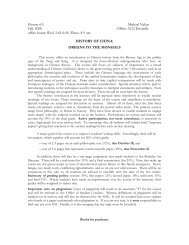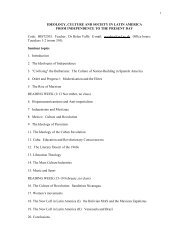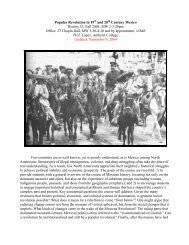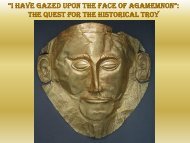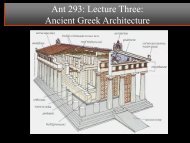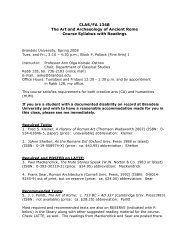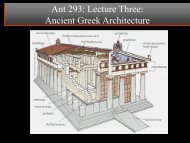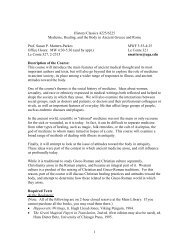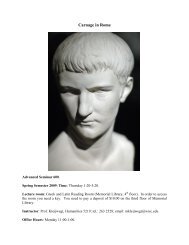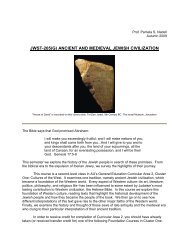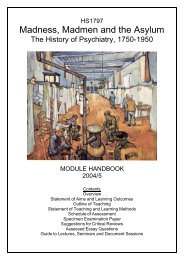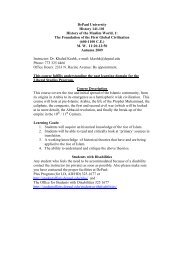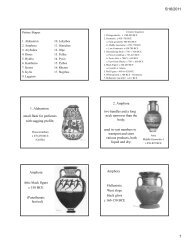CLAS 4071: Ancient Social History -- Greek And Roman Slavery
CLAS 4071: Ancient Social History -- Greek And Roman Slavery
CLAS 4071: Ancient Social History -- Greek And Roman Slavery
You also want an ePaper? Increase the reach of your titles
YUMPU automatically turns print PDFs into web optimized ePapers that Google loves.
Professor: Peter HuntTA: Rebecca GaskillClassics/<strong>History</strong> <strong>4071</strong>Hlms. 201; MWF 12:00-12:50<strong>Ancient</strong> <strong>Social</strong> <strong>History</strong>: <strong>Greek</strong> and <strong>Roman</strong> <strong>Slavery</strong>Course Description: <strong>Slavery</strong> was so central to the economy, society, and culture of ancientGreece and Rome that they are included with Brazil, the Caribbean, and the ante bellum UnitedStates South among the short list of true slave societies known to history. In this class, we’llexamine the institution of classical slavery itself as well as its relationship to the rest of <strong>Greek</strong>and <strong>Roman</strong> civilization. Given the centrality of the institution of slavery and its connections toother aspects of <strong>Greek</strong> and <strong>Roman</strong> civilization, we will end up learning a great deal about <strong>Greek</strong>and <strong>Roman</strong> political, social, and cultural history as well as about slavery.We will treat large-scale topics such as the sources of slaves, slaves in the economy, and thepolitical effects of slavery. We will also try to understand the life experiences of individualslaves in the context of their culture, family life, and manumission. We’ll consider the fullspectrum of resistance to slavery from day-to-day non-compliance to sabotage and theft to someof the largest and most violent slave revolts in history. The justifications of slavery as well asthe rare attested criticisms of the institution will provide another fascinating topic. The coursewill conclude by considering various explanations of the decline in the use of slaves in the lateantique world and the legacy of ancient slavery in the modern world.Comparisons between <strong>Greek</strong> and <strong>Roman</strong> slavery will inform many of our investigations—andoccasionally we will bring in contrasts or parallels with the better-known slave societies of theNew World. Throughout the course we will be faced with the challenge of understanding<strong>Greek</strong> and <strong>Roman</strong> slavery on the basis of our scattered and biased evidence—very little of itcoming from slaves themselves—and will engage with the controversies that have surroundedthis topic.Required Course Books:Keith Bradley, <strong>Slavery</strong> and Society at RomeN. R. E. Fisher, <strong>Slavery</strong> in Classical GreeceNiall McKeown, The Invention of <strong>Ancient</strong> <strong>Slavery</strong>?Thomas Wiedemann, <strong>Greek</strong> and <strong>Roman</strong> <strong>Slavery</strong>N.B.: When the assignment involves individual numbered passages from Wiedemann, this willbe indicated as follows: GARS #.Some articles and chapters are on electronic reserve (Classics <strong>4071</strong>). These will be identified assuch (ER). The course password is Klio.Grading and Requirements:Clicker Scores 15%Two Tests 40%Final Exam 30%Three Short Papers (1-3 pages) 15%Office Hours:Peter Hunt will hold office hours in HUMN 380 on Monday from 2-3 PM and on Wednesdayfrom 10-11 AM. These will be conducted on a first-come, first served basis; no appointment isnecessary. You can also call me at 303-492-6447. I check my e-mail most days. Rebecca Gaskillwill hold her office hours in HUMN 380 on Thursday from 4-5 PM.
Assignments:January 11-Introduction to the course.January 13-What is <strong>Slavery</strong>?Fisher, <strong>Slavery</strong> . . . “Definitions and Problems: Chattel Slaves, Serfs, and the Concept of a SlaveSociety,” 1-9Bradley, <strong>Slavery</strong> . . . “Confronting <strong>Slavery</strong> at Rome,” 1-9January 15-Historical Context: GreeceM. I. Finley, “Was <strong>Greek</strong> civilization based on slave labour?” in Economy and Society in <strong>Ancient</strong> Greece,97-115. ER.January 20-Historical Context: RomeBradley, <strong>Slavery</strong> . . . “The Slave Society at Rome,” 10-30January 22-Sources of slaves: possibilities and general considerationsWiedemann, <strong>Greek</strong> and <strong>Roman</strong> . . . “Sources of Slaves,” 106-121January 25-Sources of slaves: war and import to classical GreeceYvon Garlan, “War, Piracy, and <strong>Slavery</strong> in the <strong>Greek</strong> World” in Classical <strong>Slavery</strong>, ed. Moses I. Finley, 9-27. ERJanuary 27-Sources of slaves: the rise and fall of <strong>Roman</strong> slavery?Bradley, <strong>Slavery</strong> . . . “The <strong>Roman</strong> Slave Supply,” 31-56McKeown, The Invention . . . “A Scientific Approach to <strong>Ancient</strong> <strong>Slavery</strong>?” 124-140January 29-Slaves in the economy: productivity and statusBradley, <strong>Slavery</strong> . . . “Slave Labour,” 57-80Wiedemann, <strong>Greek</strong> and <strong>Roman</strong> . . . “Status Symbol or Economic Investment,” 78-105February 1-Slaves in the economy: agricultural labor in classical GreeceFisher, <strong>Slavery</strong> . . . “Slaves in Classical Athens: Numbers, Origins and Economic Functions,” 34-57February 3-Slaves in the economy: helots and Finleyʼs spectrum of statusesFinely, “Between slavery and freedom,” in Economy and Society in <strong>Ancient</strong> Greece, ER.Wiedemann, <strong>Greek</strong> and <strong>Roman</strong> . . . “Debt-Bondage and Serfdom,” 36-44. Skip #16.Fisher, <strong>Slavery</strong> . . . “Community Slaves or Serfs: the Spartan Helots and Others,” 22-33February 5-Slaves in the economy: rural and urban slaves of the <strong>Roman</strong> eliteWiedemann, <strong>Greek</strong> and <strong>Roman</strong> . . . “Domestic Slaves and Rural Slaves,” 122-153. Skip # 141-3.February 8-Political Effects of <strong>Slavery</strong>: introductionMcKeown, The Invention . . . “Introduction” and “The Changing Face of <strong>Roman</strong> <strong>Slavery</strong>,” 7-29February 10-Political Effects of <strong>Slavery</strong>: slavery and the egalitarian ethos at AthensFisher, <strong>Slavery</strong> . . . “The Development of Chattel <strong>Slavery</strong>: From Homer to Solon,” 10-21Wiedemann, GARS #16February 12-Political Effects of <strong>Slavery</strong>: Slaves in <strong>Greek</strong> warfareMcKeown, The Invention . . . “The <strong>Greek</strong>s Do It (a bit) Better: The Opportunities of Silence,” 141-158Peter Hunt, Slaves, Warfare, and Ideology in the <strong>Greek</strong> Historians 102-120. ER
February 15- Political Effects of <strong>Slavery</strong>: slavery in the late <strong>Roman</strong> RepublicKeith Hopkins, “Conquerors and slaves: the impact of conquering an empire on the political economy ofItaly,” in Conquerors and Slaves I, 1-37. ERGARS #141-143February 17- Political Effects of <strong>Slavery</strong>: slavery and the fall of the RepublicKeith Hopkins, “Conquerors and slaves: the impact of conquering an empire on the political economy ofItaly,” in Conquerors and Slaves II, 37-74. ERFebruary 19-Test OneFebruary 22-Slave Culture: Trojan slaves in classical AthensIan Morris, “Remaining invisible: the archaeology of the excluded in classical Athens.” ERFebruary 24-Slave Culture: <strong>Greek</strong> intellectuals as <strong>Roman</strong> slavesWiedemann, <strong>Greek</strong> and <strong>Roman</strong> . . . “The Treatment of Slaves,” 167-187GARS #73, 108, 133, 240February 26-Slave Families: gender ratios, paternalism, and family lifeBradley, <strong>Slavery</strong> . . . “Quality of Life,” 81-106March 1-Slave Families: slaves as sex and love objectsDebra Hamel, Trying Neaira 3-43. ERWiedemann, <strong>Greek</strong> and <strong>Roman</strong> . . . # 5.19, 22, 26, 33, 47, 156, 194-5March 3-Slave Families: slave families on <strong>Roman</strong> epitaphsWiedemann, #50.Susan Treggiari, “Family life among the staff of the Volusii,” TAPA 105 (1975) 393-401. ERMarch 5-Manumission: definition, results, and causesWiedemann, <strong>Greek</strong> and <strong>Roman</strong> . . . “Manumission,” 45-60, skip #23-5Start Demosthenes, For Phormio. ER.March 8-Manumission: Pasion and his family at AthensDemosthenes, For Phormio. ERMarch 10-Manumission: Manumission records at Hellenistic DelphiKeith Hopkins, “Between slavery and freedom: on freeing slaves at Delphi”. ERWiedemann, <strong>Greek</strong> and <strong>Roman</strong> . . . #23-25March 12-Manumission: the great imperial freedmenWiedemann, <strong>Greek</strong> and <strong>Roman</strong> . . . “Slaves owned by the state,” 154-166#65-71, 79TBAMarch 15-Resistance and Accommodation: treatment of slavesFisher, <strong>Slavery</strong> . . . “Slaves in Classical Athens: Treatment and Hopes for Freedom,” 58-78McKeown, The Invention . . . “<strong>Ancient</strong> <strong>Slavery</strong> and Modern Geography,” 30-51Wiedemann, <strong>Greek</strong> and <strong>Roman</strong> . . .#147-9, 157March 17-Resistance and Accommodation: loyal and clever slaves in New Comedy
McKeown, The Invention . . . “’I too want to tell a story . . . “; Some modern literary scholars andancient slavery,” 97-123March 19-Test TwoSpring BreakMarch 29-Resistance and Accommodation: low-level resistance, runaways, and banditsBradley, <strong>Slavery</strong> . . . “Resisting <strong>Slavery</strong>,” 107-131McKeown, The Invention . . . “Keith Bradley: Passionate about <strong>Slavery</strong>” 77-96Wiedemann, <strong>Greek</strong> and <strong>Roman</strong> . . . “Resistance,” 188-197March 31-Rebellion: contributory factorsFisher, <strong>Slavery</strong> . . . “Resistance, Flight and Revolt,” 79-85Paul Cartledge, “Rebels and Sambos in ancient Greece,” in Spartan Reflections, 127-152. ERApril 2-Rebellion: Slave WarsWiedemann, <strong>Greek</strong> and <strong>Roman</strong> . . . page 84-86Wiedemann, <strong>Greek</strong> and <strong>Roman</strong> . . . “Rebellion,” 198-223April 5-Rebellion: Spartacus and his legacyTheresa Urbainczyk, Spartacus 92-130. ERApril 7- Justifying <strong>Slavery</strong>: ethnocentrism, militarism, and chancePeter Hunt, “<strong>Slavery</strong> in <strong>Greek</strong> literary culture,” forthcoming in the Cambridge World <strong>History</strong> of <strong>Slavery</strong>.ERWiedemann, <strong>Greek</strong> and <strong>Roman</strong> . . . “Moral Inferiors,” 61-77, skip #65-71April 9- Guest Lecturer, Professor Eckart Schütrumpf on Aristotleʼs theory of naturalslaveryFisher, <strong>Slavery</strong> . . .” Justifications: Barbarians and Natural Slaves,” 86-98Wiedemann, <strong>Greek</strong> and <strong>Roman</strong> . . . #2April 12- Justifying <strong>Slavery</strong>: Stoicism, Christianity, and “true” slaveryWiedemann, <strong>Greek</strong> and <strong>Roman</strong> . . . “The True Freedom of the Spirit,” 224-251 and #213, 219De Ste. Croix, The Class Struggle in the <strong>Ancient</strong> <strong>Greek</strong> World, 418-425. ERApril 14-Critics of <strong>Slavery</strong>: introductionPeter Garnsey, Ideas of <strong>Slavery</strong> from Aristotle to Augustine 53-86. ERApril 16-Critics of <strong>Slavery</strong>: slaves in utopia and dramaJoseph Vogt, “<strong>Slavery</strong> in <strong>Greek</strong> Utopias.” ERStephen Daitz, “Concepts of freedom and slavery in Euripides Hecuba.” ERApril 19-Critics of <strong>Slavery</strong>: the amelioration of slavery in <strong>Roman</strong> lawBradley, <strong>Slavery</strong> . . . “<strong>Slavery</strong> and Progress,” 154-173Wiedemann, <strong>Greek</strong> and <strong>Roman</strong> . . . #4-14, 226.April 21-Decline and Legacy: dating and explaining the decline of slaveryMcKeown, The Invention . . . “Struggling with Class: Shtaerman, Trofimova and a Marxist Viewof <strong>Roman</strong> <strong>Slavery</strong>,” 52-76April 23-Decline and Legacy: the ideal of freedom and other intellectual legaciesFisher, <strong>Slavery</strong> . . . “Associated Ideologies: Work, Leisure, and Sex,” 99-108
April 26-Decline and Legacy: slavery becomes a moral problemDavid Brion Davis, The Problem of <strong>Slavery</strong> in Western Culture, 3-28. ER.
April 28-Review SessionMcKeown, The Invention . . . “Conclusion,” 159-164Bradley, <strong>Slavery</strong> . . . “To be a slave,” 174-182April 30-Reading day, no classMay 1 st Final Exam: 7:30-10:00 PMH1N1:University Policies:Students who are ill with flu-like symptoms should NOT come to class or have close contact withother students (e.g.,study groups). They should NOT return to class until 24 hours after fever hasabated. Faculty should follow the same guidelines.--If H1N1 is suspected, do not visit your health care provider unless you are experiencing flu-likesymptoms AND you have an underlying health condition (pregnancy, asthma, diabetes,undergoing chemotherapy, etc.), OR your condition worsens.--To prevent the spread of illness, health authorities are discouraging visits to health facilities torequest a doctor's note to document absence. The campus needs to operate within this parameterwhich is a major departure from our standard practice.Disabilities: If you qualify for accommodations because of a disability, please submit to me aletter from Disability Services in a timely manner so that your needs be addressed. DisabilityServices determines accommodations based on documented disabilities. Contact: 303-492-8671,Willard 322, and http://www.Colorado.EDU/disabilityservicesReligious Observances: Campus policy regarding religious observances requires that facultymake every effort to deal reasonably and fairly with all students who, because of religiousobligations, have conflicts with scheduled exams, assignments or required attendance. See fulldetails at http://www.colorado.edu/policies/fac_relig.html. Please let me know if you haveany such issues or concerns.Learning EnvironmentStudents and faculty each have responsibility for maintaining an appropriate learningenvironment. Those who fail to adhere to such behavioral standards may be subject to discipline.Professional courtesy and sensitivity are especially important with respect to individuals andtopics dealing with differences of race, culture, religion, politics, sexual orientation, gender,gender variance, and nationalities. Class rosters are provided to the instructor with the student'slegal name. I will gladly honor your request to address you by an alternate name or genderpronoun. Please adviseme of this preference early in the semester so that I may make appropriate changes to myrecords. See policies athttp://www.colorado.edu/policies/classbehavior.html and athttp://www.colorado.edu/studentaffairs/judicialaffairs/code.html#student_codeDiscrimination and Sexual HarassmentThe University of Colorado at Boulder policy on Discrimination andHarassment, the University of Colorado policy on Sexual Harassment and the University ofColorado policy on Amorous Relationships apply to all students, staff and faculty. Any student,staff or faculty member who believes s/he has been the subject of sexual harassment ordiscrimination or harassment based upon race, color, national origin, sex, age, disability, creed,religion, sexual orientation, or veteran status should contact the Office of Discrimination andHarassment (ODH) at 303-492-2127 or the Office of Judicial Affairs at 303-492-5550. Informationabout the ODH, the above referenced policies and the campus resources available to assist
individualsregarding discrimination or harassment can be obtained athttp://www.colorado.edu/odhAcademic DishonestyAll students of the University of Colorado at Boulder are responsible for knowing and adheringto the academic integrity policy of this institution. Violations of this policy may include: cheating,plagiarism, aid of academic dishonesty, fabrication, lying, bribery, and threatening behavior. Allincidents of academic misconduct shall be reported to the Honor Code Council(honor@colorado.edu; 303-735-2273). Students who are found to be in violation of the academicintegrity policy will be subject to both academic sanctions from the faculty member and nonacademicsanctions (including but not limited to university probation, suspension, or expulsion).Other information on the Honor Code can be found athttp://www.colorado.edu/policies/honor.html and athttp://www.colorado.edu/academics/honorcode/



